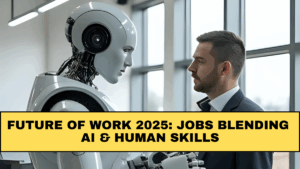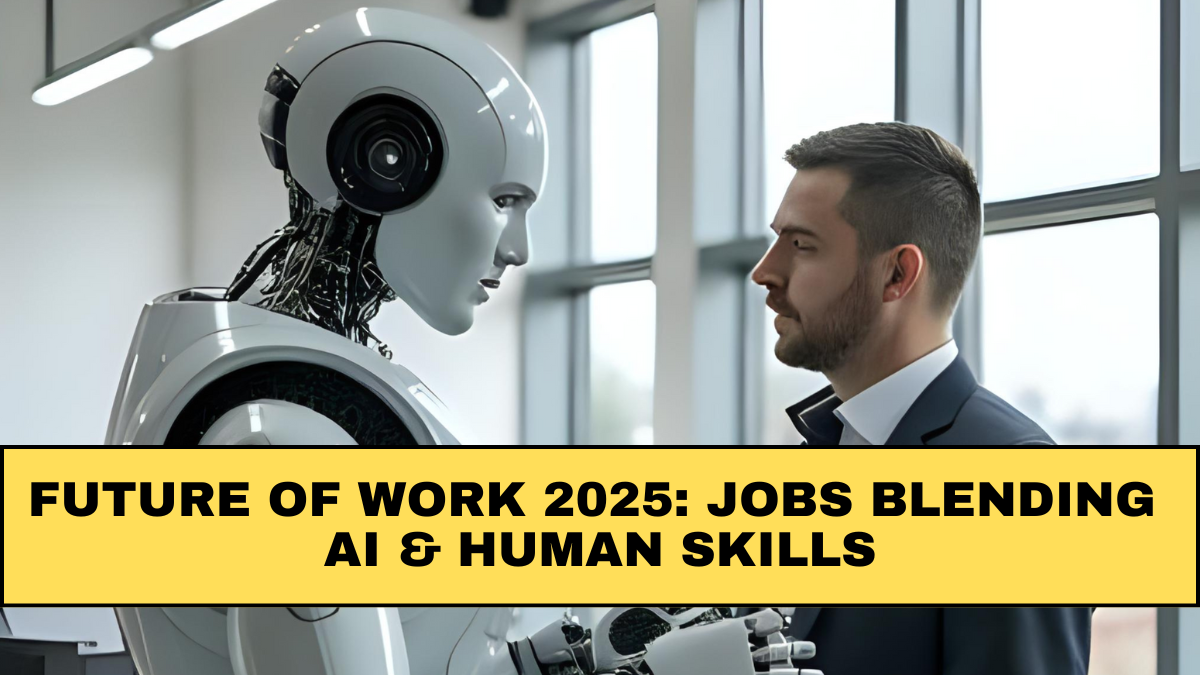The Future of Work 2025 is being shaped by the integration of artificial intelligence, automation, and human creativity. As industries adopt AI tools and smart systems, new hybrid jobs are emerging that require employees to collaborate with machines while leveraging uniquely human skills such as critical thinking, empathy, and problem-solving. This evolution is transforming traditional career paths and creating opportunities for professionals who can bridge technology and human insight.
Employers are now looking for a workforce that is adaptable, digitally literate, and capable of managing AI-powered workflows. Roles that combine technical expertise with creative or analytical thinking are in high demand, spanning sectors such as healthcare, finance, education, and technology. Hybrid jobs allow humans and AI to complement each other, optimizing productivity while fostering innovation.

Key Trends Shaping the Workforce in 2025
AI-driven tools are being integrated into workplaces across industries. Professionals are required to understand data analytics, machine learning basics, and AI-assisted decision-making. At the same time, soft skills like leadership, collaboration, and emotional intelligence remain critical. This blend of capabilities defines the new hybrid job roles.
Companies are also adopting flexible work models, with hybrid jobs often allowing remote or partially remote work. Digital platforms, cloud-based systems, and AI-driven project management tools support collaboration, tracking, and workflow automation. Employees need to navigate these tools effectively to maintain productivity.
Emerging Hybrid Jobs
Several new roles are emerging as part of the Future of Work 2025. AI trainers, who teach machines to understand human input, are essential in improving automated systems. Data interpreters convert AI-generated insights into actionable business strategies. Digital health coordinators integrate AI solutions into patient care, while creative technologists blend design thinking with AI for marketing, entertainment, and product development.
These roles highlight how AI is not replacing humans but augmenting their capabilities. Employees who can manage, analyze, and apply AI outputs creatively gain a competitive advantage in the labor market.
Skills Needed for Hybrid Careers
To succeed in 2025, workers need a combination of technical, analytical, and interpersonal skills. Knowledge of AI, programming, and data visualization is critical, alongside creativity, adaptability, and problem-solving. Lifelong learning and continuous upskilling are also essential as AI tools evolve rapidly.
Education systems and training programs are adapting to these trends by offering courses in AI, machine learning, human-computer interaction, and hybrid work skills. Professionals are encouraged to embrace reskilling initiatives to remain relevant in the dynamic job market.
Benefits of AI-Human Collaboration
Hybrid jobs allow organizations to leverage both human judgment and AI efficiency. Repetitive tasks are automated, freeing humans to focus on strategy, innovation, and creative problem-solving. This collaboration improves decision-making, reduces errors, and increases productivity while creating meaningful work opportunities that were previously unavailable.
Employees also benefit from hybrid work models that offer flexibility, improved work-life balance, and opportunities for skill growth. Organizations gain more agile, innovative, and technologically empowered teams.
Conclusion
The Future of Work 2025 is defined by the synergy between humans and AI. Hybrid jobs blending creativity, technical skills, and machine intelligence are shaping the next generation of careers. Professionals who embrace AI as a collaborative tool while enhancing uniquely human skills will thrive in this evolving workforce. By fostering adaptability, continuous learning, and cross-functional expertise, both employees and organizations can maximize the opportunities presented by this new era of work.
FAQs
What are hybrid jobs in 2025?
Hybrid jobs combine human skills with AI tools, requiring both technical knowledge and creativity.
Which sectors are adopting hybrid roles?
Healthcare, finance, education, technology, and creative industries are leading in hybrid job adoption.
What skills are essential for the future workforce?
Technical skills like AI and data analytics, along with creativity, problem-solving, and emotional intelligence.
Will AI replace human jobs completely?
No, AI complements human work, creating hybrid roles that enhance productivity and innovation.
How can professionals prepare for hybrid careers?
Upskilling in AI, continuous learning, and developing both technical and soft skills are crucial for staying relevant.
